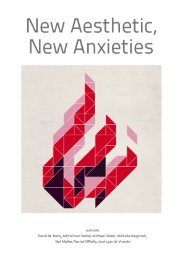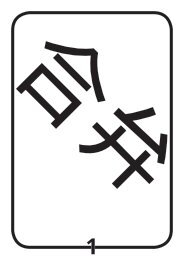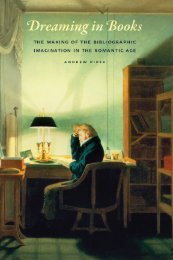You also want an ePaper? Increase the reach of your titles
YUMPU automatically turns print PDFs into web optimized ePapers that Google loves.
Roland Barthes<br />
The Death o! the Author/ /1968<br />
Roland Barthes' short essay 'The Death of the Author' (1968) should ideally be read<br />
alongside 'From War" to Text' (1971) as his key statement on the idea that a wor"'s<br />
meaning is not dependent on authorial intention but on the individual point of<br />
active reception. Barthes was concerned primarily with lit'erature but his insights are<br />
analogous to much contemporary art of this period, particularly wor"s that<br />
emphasize the viewer's role in their completion.<br />
In his story Sarrasine Balzac, describing a castrato disguised as a woman, writes<br />
the following sentence: 'This was woman herself, with her sudden fears, her<br />
irrational whims, her instinctive worries, her impetuous boldness, her fussings,<br />
and her delicious sensibility: Who is speaking thus? Is it the hero of the story bent<br />
on remaining ignorant of the castrato hidden beneath the woman? Is it Balzac the<br />
individual, furnished by his personal experience with a philosophy of Woman? Is<br />
it Balzac the author professing 'literary' ideas on femininity? Is it universal<br />
wisdom? Romantic psychology? We shall never know, for the good reason that<br />
writing is the destruction of every voice, of every point of origin. Writing is that<br />
neutral, composite, oblique space where our subject slips away; the negative<br />
where all identity is lost, starting with the very identity of the body writing.<br />
No doubt it has always been that way. As soon as a fact is narrated no longer<br />
with a view to acting directly on reality but iritransitively, that is to say, finally<br />
outside of any function other than that of the very practice of the symbol itself,<br />
this disconnection occurs, the voice loses its origin, the author enters into his<br />
own death, writing begins. The sense of this phenomenon, however, has varied;<br />
in ethnographic societies the responsibility for a narrative is never assumed by<br />
a person but by a mediator, shaman or relator whose 'performance' - the<br />
mastery of the narrative code - may possibly be admired but never his 'genius',<br />
The author is a modern figure, a product of our society in so far as, emerging<br />
from the Middle Ages with English empiricism, French rationalism and the<br />
personal faith of the Reformation, it discovered the prestige of the individual, of,<br />
as it is more nobly put, the 'human person'. It is thus logical that in literature it<br />
should be this positivism, the epitome and culmination of capitalist ideology,<br />
which has attached the greatest importance to the 'person' of the author. The<br />
author still reigns, in histories of literature, biographies of writers, interviews,<br />
magazines, as in the very consciousness of men of letters anxious to unite their<br />
person and their work through diaries and memoirs, The image of literature to<br />
Barthes//-The Death of the AuthorJI41








